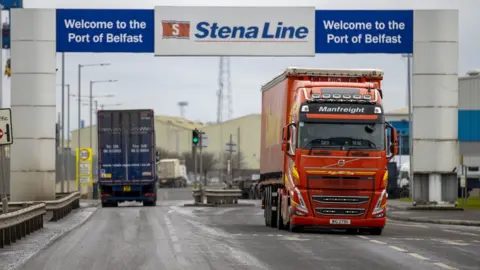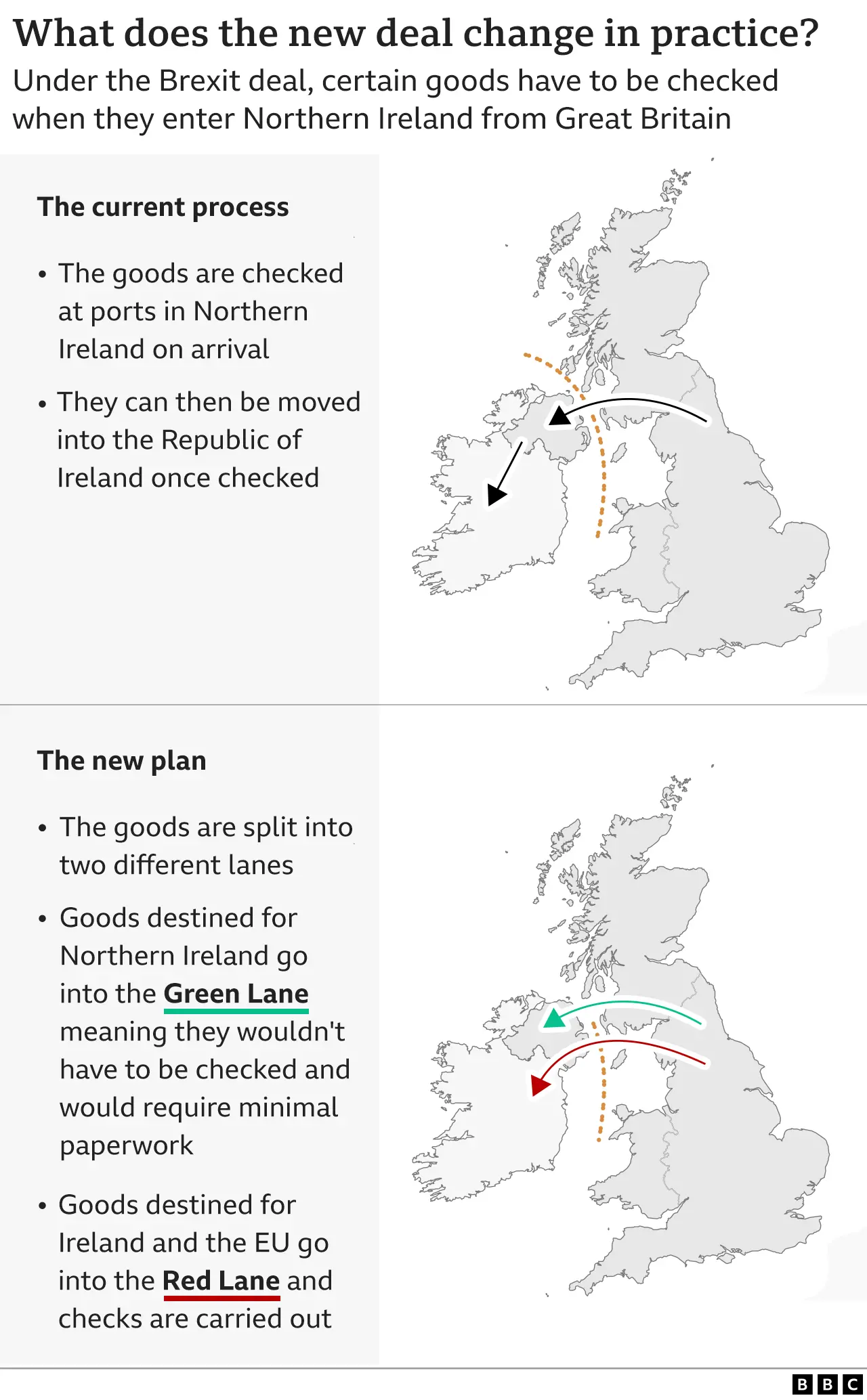Northern Ireland Brexit deal: At-a-glance
 Getty Images
Getty ImagesUK Prime Minister Rishi Sunak and President of the European Commission Ursula von der Leyen have announced a new deal, aimed at fixing post-Brexit problems in Northern Ireland.
The full details of their agreement have been published.
Here is what we know about the agreement, named the Windsor Framework:
Green lane/red lane
- Goods from Britain destined for Northern Ireland will travel through a new "green lane", with a separate "red lane" for goods at risk of moving onto the EU
- Products coming into Northern Ireland through the green lane would see checks and paperwork significantly reduced
- Red lane goods destined for the EU still be subject to normal checks
- Mr Sunak said this would mean food available on the supermarket shelves in Great Britain will be available on supermarket shelves in Northern Ireland
- New data-sharing and labelling arrangements would be used to oversee the new system
- Where smuggling is suspected, some custom checks may still be carried out on green lane goods
- Businesses moving goods from Northern Ireland to Great Britain would not be required to complete export declarations
- Bans on certain products - like chilled sausages - entering Northern Ireland from Britain would be scrapped
- Bans also lifted on seed potatoes and 11 native British trees
Pets, parcels and medicines
- No new requirements on moving pets from Northern Ireland to Britain
- Pet owners visiting Northern Ireland from Britain (but not travelling on to Ireland) only have to confirm their pet is microchipped and will not move into the EU
- Under old rules, pet owners had to have vet-issued health certificate and proof of up-to-date rabies vaccination, while dogs needed tapeworm treatment before every visit
- Medicines for use in Northern Ireland would be approved by UK regulator, with the European Medicines Agency not having any role
- Parcels will not be subject to full custom declarations
- From 2024, parcel operators required to share data with EU to manage smuggling risks
VAT and alcohol duty
- Under the Northern Ireland Protocol, EU VAT rules could be applied in Northern Ireland
- Under the new deal, UK VAT and excise rules will apply to Northern Ireland for alcoholic drinks for immediate consumption and immovable goods such as heat pumps
- EU VAT rules will still apply for other items
Stormont brake
- Under the protocol, some EU law applies in Northern Ireland, but politicians had no formal way to influence the rules
- New agreement reduces proportion of EU rules applied in Northern Ireland to less than 3%
- European Court of Justice continues to be the final arbiter in disputes over these remaining rules
- Deal introduces a "Stormont brake" which allows the Northern Ireland Assembly to raise an objection to a new goods rule
- Process would be triggered if 30 MLAs (representatives in the Stormont) from two or more parties sign a petition
- The brake cannot be used for "trivial reasons" but reserved for "significantly different" rules
- Once the UK tells the EU the brake has been triggered, the rule cannot be implemented
- It can only be applied if the UK and EU agree
- This new process is not subject to oversight by the European Court of Justice oversight
- Disputes would be resolved through independent arbitration
- The EU has its own safeguard - if Northern Ireland starts to diverge significantly from the bloc's rules, the EU has power to take "appropriate remedial measures"
Northern Ireland Bill scrapped
- Government has confirmed it is ditching the Northern Ireland Protocol Bill
- The controversial legislation, introduced under ex-PM Boris Johnson, would have given the UK the power to scrap the old protocol deal
- Legal opinion published by the government says there is now "no legal justification" for going ahead with it
 .
.